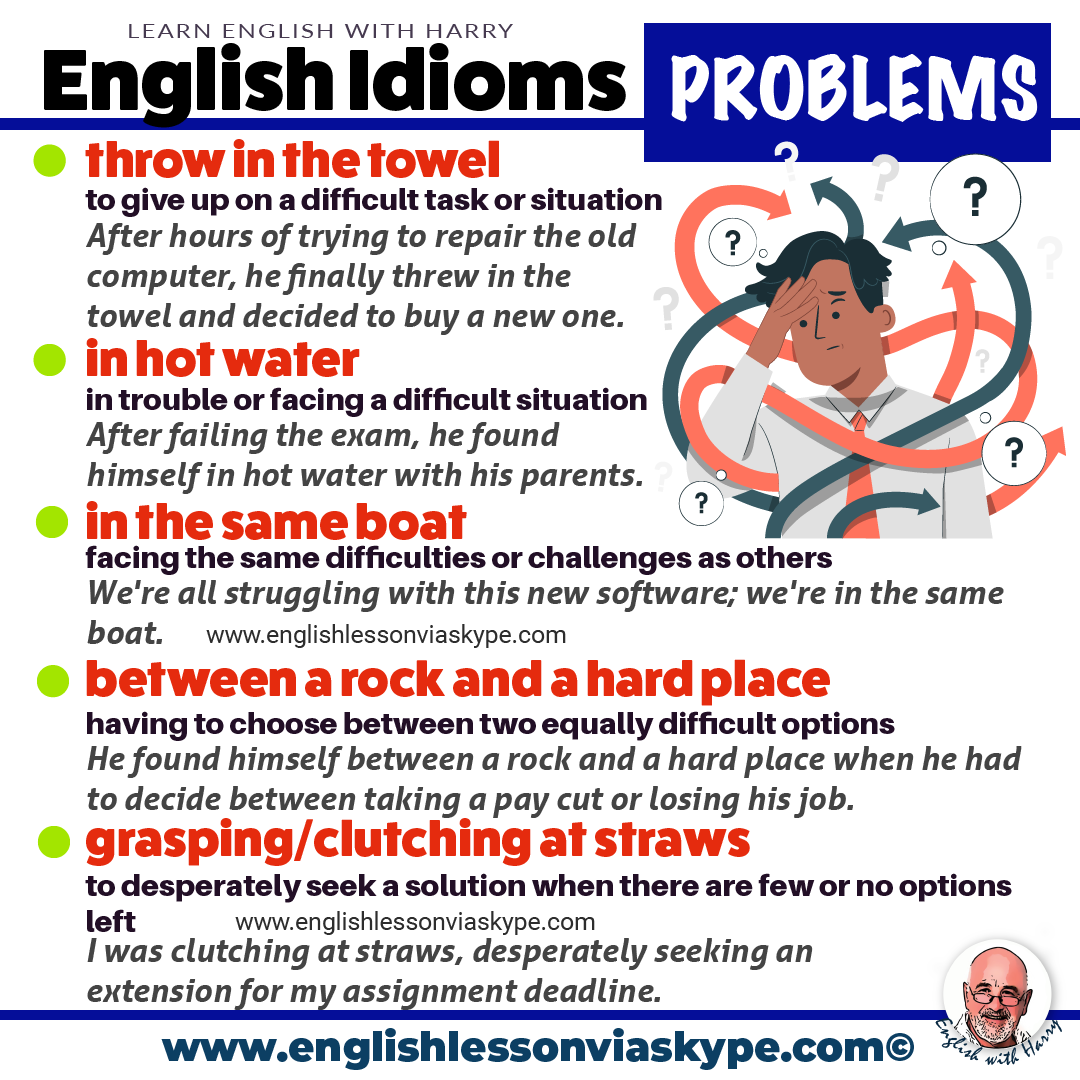Mastering English idioms for problem-solving will help you improve your speaking skills. In this lesson, you’ll learn advanced English idioms that can help improve your speaking and make you better at English.
If you’re trying to get better at English, maybe for tests like IELTS, CAE, or TOEFL, or just to speak more like a native speaker with confidence, this lesson can help you a lot.
Listen to the podcast Speak Better English with Harry or watch it on YouTube at Learn English with Harry. englishclass101
list of english idioms
Mastering English Idioms for Problem-Solving
Harry
Today, we’re going to explore a fascinating topic that can help you understand English better and make your conversations more interesting. We’ll be diving into ’10 Idioms Related to Problems and Difficulties.’ Idioms are like secret codes in English that express ideas in fun and creative ways.
By learning these idioms, you’ll be able to talk about challenges and difficulties just like a native speaker. So, let’s get started.
improve english on a budget
Online English Courses from €7.99
at your wits’ end
Meaning: being extremely frustrated or unable to find a solution to a problem
Examples:
In the math exam, I couldn’t solve the last question, and I was at my wits’ end.
I asked the bank for a loan, but it was denied. I asked my parents for help. I’m really at my wits’ end.
to be grasping/clutching at straws
Meaning: to desperately seek a solution when there are few or no options left
Examples:
I lost my wallet and had no money. I searched the park, hoping to find it, but I was clutching at straws.
Clutching at straws, Sarah asked for an advance on next month’s salary to cover unexpected expenses.
I was clutching at straws, desperately seeking an extension for my assignment deadline.
I often see students clutching at straws as they try to find ways to get deadline extensions.
to go south
Meaning: something is not going well or has become worse
Examples:
My life has gone south – my relationship broke up, my landlord increased the rent, and I lost my job due to budget cuts.
The stock market often goes south when unexpected economic factors come into play.
The performance of Manchester United has gone south recently, sparking disappointment among fans.
Mastering English Idioms for Problem-Solving

in hot water
Meaning: to be in trouble or facing difficulties due to a mistake or wrongdoing
Examples:
John found himself in hot water when he realised he had forgotten his wife’s birthday.
Michael was in hot water with his boss after failing to send the report on time.
Emily ended up in hot water with her lecturer when she failed to hand in her paper on time.
to have you back to/ against the wall
Meaning: to be in a difficult situation with limited options and feeling trapped
Examples:
With his back to the wall financially, Mark had to take on a part-time job to make ends meet.
My back’s against the wall. If I don’t complete this report now, we won’t be able to collect the fees.
When I lost my wallet and had no money, I felt like my back was against the wall.
catch-22
Meaning: a problem with no good solution because two rules or conditions conflict with each other.
Examples:
I wanted to buy a car, but I needed a job for money, and I needed a car to get to the job. It was a catch-22.
I needed a job to get experience, but every job required experience. It was a catch-22.
book your trial English Lesson
a can of worms
Meaning: a complicated or difficult situation that, once opened or started, becomes even more complicated or problematic
Examples:
Bringing up that topic at the family dinner opened a whole can of worms.
Lisa’s relationship with her boyfriend is complicated. I’d suggest not getting too involved; it’s a real can of worms.
I wouldn’t touch this account; it’s a real can of worms.
vicious circle
Meaning: a cycle of problems that keep getting worse
Examples:
His debt led to stress, which affected his job, and losing his job worsened his debt. It was a vicious circle.
The boss wants us to do this, but accounts want the customer to pay, and they won’t – it’s a vicious circle.
Mastering English Idioms for Problem-Solving

think on your feet
Meaning: to make quick decisions or come up with solutions in a fast-paced and unexpected situation
Examples:
During the interview, I had to think on my feet and quickly answer unexpected questions.
It’s important to be able to think on your feet when unexpected tasks or challenges arise.
have a lightbulb moment
Meaning: suddenly understand something or have a bright idea
Examples:
While I was taking a shower, I had a lightbulb moment and came up with a brilliant idea for our project.
During math class, I had a lightbulb moment when I finally understood how to solve multiplications.
So those are all idioms, they are quite difficult idioms relating to problems and difficulties in your life in work, whatever it might be. Okay, let me go through them one more time:
As I mentioned before, if you want to practice these English idioms related to problems, please go ahead. If you have any problems or need more examples, you can reach out to me through the website www.englishlessonviaskype.com. I’m always glad to hear from you. If you have any questions, or concerns, or want to improve your English, just send me a message.
Thank you for joining us; we really appreciate it.
speak better English with Harry podcast- episode 451
more information
For more information on English grammar rules, English collocations and English idioms, check out the links below:
Advanced adjectives to describe travel experiences
You can always study English advanced level at Learning English with the BBC and British Council Learn English.
You will love these English lessons

How To Ask Someone To Wait In English
Learn how to ask someone to wait in English. Whether you’re on the phone, talking to your friends, or participating


Asking for a Refund in English
Asking for a refund in English couldn’t be easier with these phrases! Here you will also learn useful words and


Vocabulary Expressions Related To Housework
Learn vocabulary expressions related to housework. Spick and span meaning. Clean in every nook and cranny meaning. Learn popular English
